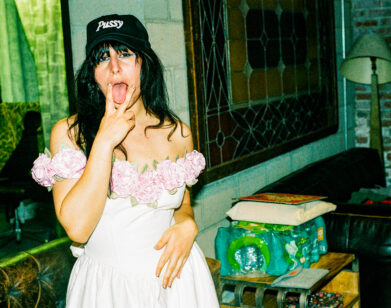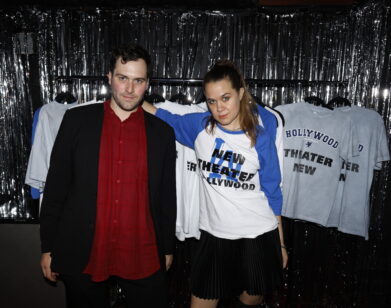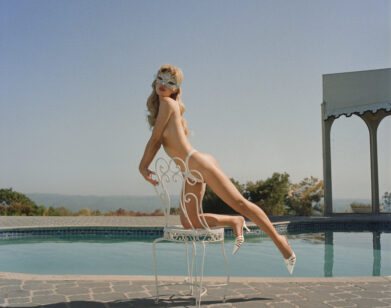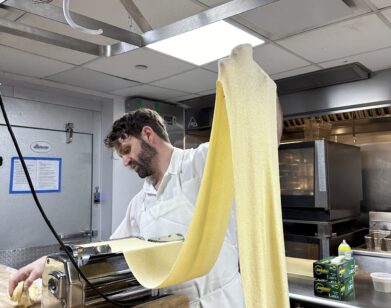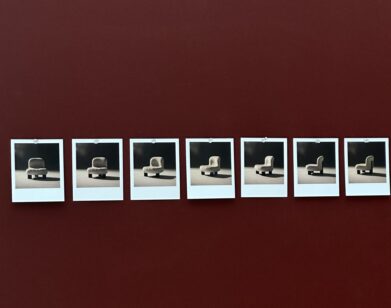Brit Marling
Out of nowhere, with no warning, no preamble or press release, a woman in a raggedy dress appeared on a bridge, on our streaming devices last December, running through traffic. Almost as suddenly as she’d arrived, though, she was over the guardrail, on the edge, looking back—pausing (to see if we were watching?)—and then over she went, into the unknown.
That woman, as those of us who were watching, and who followed her over the edge, would come to learn, was “The OA,” as she called herself (née Nina, raised Prairie Johnson), an onion of a character and unreliable narrator played by Brit Marling, the star, co-writer, and co-creator of The OA, an amorphous show, the first season of which was surprise-dropped in eight parts on Netflix during the 2016 holiday season and is still a topic of internet debate. For Marling, and director, co-creator, and co-writer Zal Batmanglij, whom she met at Georgetown University, where she was her class valedictorian, the show—with its mélange of references, from The Iliad to school shootings and near death experiences, touching on both Russian oligarchs and the multiverse—was a kind of culmination of their ongoing collaboration, which includes the Sundance hit Sound of My Voice (2012) and the corporation-warrior thriller The East (2013). The expansive canvas and unfettered creative control afforded them by Netflix and Brad Pitt’s Plan B Entertainment, which produced it, allowed the creators to explore their ideas further and more fully than ever before. But, as Marling says, the first season of The OA is only the beginning, the first chapter in a larger novel—or, as she has called it, the outer ring of a labyrinth.
And as Marling, 34, tells her friend, the writer Malcolm Gladwell, she has a surprise in store for those of us who have followed her over the edge, into the labyrinth—and it will all be worth it in the end.

MALCOLM GLADWELL: You’ve done a number of movies, but this is the first time you have been involved with the creation of your own television show. So eight hours as opposed to an hour and a half. How does storytelling change when you have to think about engaging the audience for eight episodes, which is a commitment? I watched one show a night for eight days. And by the end, you owned me. [laughs] So that is quite unlike a movie experience.
BRIT MARLING: Do you not feel owned by a movie experience then?
GLADWELL: I guess I’m asking if you, as a creator, see a difference between those two modes, because, as a consumer, I did.
MARLING: I think what you’re going to suggest is that the more time you invest in something, potentially, the deeper the emotional impact of the climax. I think you’re right. It’s true of relationships, too. With the person you’ve been friends with for 15 years, your interactions are charged with a different depth than with someone you’ve known for a year. When Zal and I first thought about doing this, we never thought of it as television. It was around the time in which those boundaries were breaking down, and we always just thought, “How much space do we need to tell the story? Let’s just let the story tell itself over that amount of space.” We kept running into this density issue with the films we were doing. We always had these big ideas for stories about tribalism and groups. And so you’d spend so much time setting up the world and the rules of that world and each one of these characters. And by the time you’d done all that work, you had, like, 30 minutes to play, and then you had to get out. So we just need more time. There’s a reason that Sound of My Voice was conceived of as the first part of a trilogy. In our minds, we felt like we were just telling the first part of that story. So The OA came about as an exercise in letting the story be the queen—she just says what she wants and you follow her bidding. She wants the first chapter to be an hour and ten minutes with the credits coming 57 minutes in—well, okay.
GLADWELL: What are the risks of storytelling on that scale?
MARLING: I mean, they’re massive. Every day of writing this, every day of shooting it, we felt genuine terror. And I’ve started to realize that if you’re not in that space, it’s actually dangerous; that there’s something about being on the knife’s edge that keeps you hypervigilant, hyperalert. You know that if any one thing goes off, the whole story crumbles. Like, if you don’t cast the right Betty Broderick Allen—if you don’t find Phyllis Smith and convince Phyllis Smith to move from St. Louis to New York and bring her four cats and her two turtles and her mother so she feels comfortable in that space—if you fail to get that part right, the whole thing just unravels.
GLADWELL: In a movie, she might have ten minutes and you could get over it. In this show, where we see her every episode for eight episodes…
MARLING: Yeah, and possibly, if it’s some kind of success, you could be with her for years. That’s a real commitment to somebody. And for ourselves. We felt like we had to bring on actors and collaborators who we could potentially spend a huge chunk of our lives working with, and who we’d be totally thrilled to come to work with every day. The stakes are higher, and maybe that makes you more vigilant, which is important.
GLADWELL: Now, you’re talking about this from the perspective of the storytelling. What are the risks for the audience? I ask that because I’ve found that television allows the audience to argue with the creator in a way you don’t in a movie.
MARLING: Because you don’t have the time. The movie is like a perfect proof. It has just the number of steps you need to make a thesis; it’s like a poem. Long format has a lot more entry points for argument and for dialogue. There’s a lot of space for other thoughts to come in, to sit on something for a while and think about it and have a different point of view. Yeah, I think the risks are intense because it has to really all add up; especially if you’re doing something of a mind-bender mystery. Which is why we spent a good year and a half thinking about the world and the riddles and how to solve them before going into the writers’ room, so that if we ever got to the center of the labyrinth, the minotaur there would have been worth the hours that the audience could potentially end up investing in it.
GLADWELL: When you started filming episode one, did you know what episode eight looked like?
MARLING: Definitely. We wrote all eight hours upfront. And then we shot it like an eight-hour film. Usually when you shoot TV, one director is doing the first episode; someone else is prepping the second. And you kind of volley forward. But we would have days where we’d shoot something from chapter four, something from chapter six, something from chapter one, all next to each other. And I think what makes The OA interesting or strange for people is that it is largely shaped by two voices. That isn’t usually the case.
GLADWELL: Is it confusing to act in something that you played such a large role in writing? You’re not just saying lines that you wrote; you’re also acting with people who are saying lines that you wrote.
MARLING: Right. [laughs] I think it is odd, but I have this weird ability to compartmentalize. In my real life, as Brit, that’s probably not the most successful trait. I think my family would say that that’s really frustrating. [laughs] But in the work, it’s really great because when we were in the writers’ room—we worked with three very gifted playwrights—we all forgot that I was going to play the character. You kind of have to, otherwise you wouldn’t put that character in so many difficult situations, you wouldn’t take so many risks. And then, on set, it was very important that the actors were in a tribe together. Anything Zal and I do as show runners kind of happens off set, out of bounds. Because there’s something important between actors, all of us feeling that the script is something we receive, that the words are not from someone, that they’re like from the ether. So I never had a moment on set where I was like, “Ooh, that line sounds good.” By that point, it feels like it comes from someplace else.
GLADWELL: You disassociated?
MARLING: Completely disassociated. And then I did it again in the edit room. At one point on The East, our wonderful editor, Andy Weisblum, was like, “I don’t know about the lead actress sitting in the edit every day.” Because, of course, in the past, if you have a lead actor in there, usually they’re like, “I don’t like the way I look in that scene. That’s not my good side.” [both laugh] But I genuinely compartmentalize and I don’t think the person on the screen—
GLADWELL: Is you.
MARLING: Is me, Brit. I think it’s Prairie or Sarah Moss or Rhoda Williams. And as a screenwriter, I’m really just trying to figure out how in the edit to rewrite the footage.
GLADWELL: This really does sound like a mythology.
MARLING: If you looked at it under any other context, you would be like, “This person is not well.” [laughs] But for some reason, in this space it’s okay.
GLADWELL: Although, to rescue you for a moment—
MARLING: Please rescue me. [laughs]
GLADWELL: All artists have to do that at a certain point. This shift that has to happen between the initial moment of creation and then the consideration of what has been created. As a writer, I know that—you write a first draft and then put it in a drawer.
The longer I can put it in a drawer, the better off I am. So I structure my writing so that things can sit.
MARLING: And this gets to why Zal and I were so moved by the story you told on your podcast about the song “Hallelujah.” It is: what if you add multiple artists? So the story is just some thing, like a prehistoric skeleton beneath the ground, and you begin by just digging in the dirt. You hit a bone and you’re like, “What’s this?” And you dig around it, trying to excavate something that exists without you. And the more artists you can bring into that—Alex DiGerlando, the production designer; Paddy Gibson, who plays Steve—you can dig out the best version of that skeleton without missing any of the bones, and then stand it up. That story you told about “Hallelujah” is, I think, evidence of that. Leonard Cohen opens himself up as a vessel and writes, for years, on this song. And I love that he has all these lyrics, some of which he throws away. But John Cale hears it and is like, “Send it to me. I want to cover it.” Cale ends up rewriting Cohen and simplifies the arrangement. And then when Buckley hears the Cale version, he’s like, “Hmm, not the piano, but he was correct to simplify. I’m going to do it even simpler guitar.” Now you add the audience’s rewriting of it, because Buckley’s version doesn’t really catch fire until he dies and the tragedy of a young, beautiful man cut before full bloom gives the audience permission to rewrite the meaning of the song. And then it becomes this thing.
GLADWELL: It’s even better than that, because it keeps going. And there’s a point where it’s no longer improving; it’s getting worse. But the bad versions make you understand the genius of the great version. So when Jon Bon Jovi does it … I happen to love Jon Bon Jovi. I don’t think that’s a great version. But it’s good because when you hear it, you’re like, “Oh, okay, now I understand.”
MARLING: What Jeff Buckley’s was.
GLADWELL: Actually, John Cale’s is the best for me. But I understand John Cale when I hear everyone else explore it. So even in the flawed explorations of the song, that helps the beauty of the song emerge. It puts it into even sharper relief.
MARLING: The first version I ever heard of “Hallelujah” was Jeff Buckley’s version. So, before knowing any better, I assumed he had written that song. Then, when I went back and found Leonard Cohen’s version, I couldn’t believe that this song had another form. What’s crazy is, I love Leonard Cohen … He was my hero and a poet of the highest order, but even he couldn’t dig out that poem’s best expression on his own. And that isn’t a limitation or a failure. That’s, to me, the most interesting version of art, which is when it becomes a communal activity, like a tribe trying to dig up a skeleton, a group of voices trying to purify what’s coming through. And each mind or thought is a new filter on it until what comes out is the most pure version.
GLADWELL: So if this is the kind of storytelling paradigm that you are drawn to, that requires certain things of you.
MARLING: I couldn’t be a novelist for instance.
GLADWELL: Because?
MARLING: I don’t know, but it feels like a very lonely endeavor. I don’t know that I could survive the solitude of that.
GLADWELL: Well, I was going to say, your way requires certain traits. So how do you respond to criticism? In this process. Did you ever take offense at some iteration someone wanted, some construction someone wanted to apply to your work?
MARLING: No. Because I don’t think it’s my work. And Zal doesn’t think it’s his work either. You’re just a custodian, or servant to the story. So if somebody cuts a version of the scene and they don’t get it quite right, your job as the custodian is to help them try to feel the feeling inside more deeply or more accurately, so that they can cut the best version of the scene. But I don’t even feel the pain of it being wrong, not personal pain. It’s more like, “Ugh, we’ve got to try again.” Like, “We’re missing a bone of the skeleton and so the arm isn’t standing up right. We’ve got to go back and look for a shoulder bone.”
GLADWELL: The production is very clearly a collaboration of many people. But the core collaboration is you and Zal. Tell me about the nature of your collaboration. Because on the surface, you’re quite different.
MARLING: Zal has an incredible imagination and a very specific point of view on the world. And he has the ability to articulate that point of view. I have been deeply enamored by that point of view since the very first days of knowing him in college, and with the sincerity in his pursuit of becoming more able to translate it. One of the great pleasures of my life is sitting in a room with Zal at a table having lunch, and suddenly we start storytelling. He gets up and he’s acting something out, and then I pick up the ball, and then I’m acting something out. And we’re feeding off of each other, and there’s this incredible, mad, improvised dance, the way I think jazz musicians probably feel when they’re together and they start vibing the unique sound of their instrument, one against the other and the ways in which it can build and become some wild thing beyond any one of the players playing alone in the room. It’s thrilling. I think I got very lucky to have encountered someone that made me feel that way so young.
GLADWELL: You were how old when you met him?
MARLING: Seventeen. I was a baby! [laughs]
GLADWELL: Here’s my dime-store psychoanalysis of you and Zal, and this could be totally wrong. You have very different strengths. Zal will try something radical, and if it is attacked by the world, will feel those attacks keenly but rise above them. He will recover and go back out the next day. You, in the same situation, just won’t feel the attacks. [Marling laughs] You’re like, “Whatever.” Is that wrong?
MARLING: Well, no …
GLADWELL: But I think that’s the genius of the collaboration. You both have a commitment to try this radical thing. On the one side, there is a kind of radical sensitivity and courage. On the other side, there’s just toughness. [both laugh]
MARLING: I think I do definitely have a toughness. And who knows where this shit comes from? I mean, look, somebody you admire saying something harsh about your work hurts me the way it hurts everybody else. But, for me, it just never goes very deep. It’s like someone taking a little pin and like pricking you. For better or worse, I have pretty sophisticated armor that makes me feel like the thing I’m most interested in is trying the bold thing I believe in and that that in and of itself is worth something, even if nobody gets it in the moment. You told a beautiful story about this once, about the Salon of the Refused. And if you go back and look at those paintings, the ones we all are moved by and admire now are the ones that were refused or were hung in the most distant room in the corner of the exhibit. For some reason, I have a very strange conception of time. I am constantly hovering at some overview, more macro. And what I like about acting is that you have to be super, super present in the moment. That’s not something that comes to me naturally. But if you take the long view on anything, nothing can really affect you or knock you down. It’s like, we’re here for a blink, we’re just the human experiment, one of many experiments going on in the universe, and it’s interesting, it’s beautiful by fits and starts, but I can’t take it that personally. I’m just one of billions of people attempting. Does that sound ridiculous?
GLADWELL: My point is that the great challenge of an artist is to balance those two things: to be strong enough to have your own personal vision that you will put on the page or the canvas or the screen, no matter what people say, but it requires a radical sensitivity. You have to be completely open to what the world is telling you, to what your audience tells you. And balancing those two things is nearly impossible. So most people either get stuck at one end of the continuum or they bounce back and forth in this kind of … That’s what’s so terrifying about being an artist, is that you go from one extreme to the next. But I wonder whether, in your collaboration, you haven’t, out of the sheerest good fortune, solved that?
MARLING: You know what you just reminded me of? I had this amazing acting teacher for a period. I wouldn’t even call him an acting teacher. I think he’s a thinker, a philosopher, and acting is the way that he articulates his worldview. His name is Harry Mastrogeorge. And I remember him saying to me, “To do this work, you have to have the heart of a baby and the hide of a lion.” And I think that’s exactly right.
GLADWELL: Yeah, you want to be a turtle. Because a turtle is like an eighth of an inch off the ground, so it feels every little perturbation of the earth, every pebble. [both laugh] But meanwhile, he’s got like this massive shield.
MARLING: Do you feel that you have that?
GLADWELL: No, I don’t. I’m more on the Zal end of the equation. I need a Brit Marling in my life.
MARLING: Well, you have one. [both laugh]
GLADWELL: He’s luckier than I am. But wait, the trajectory that you have been on has often had some element of fantasy or, not really science fiction, but something in that world. Is there a reason for that?
MARLING: For me, fantasy and speculative science fiction are the genres that feel closest to how I feel about being alive. Like, when I feel the most invigorated by just even a walk down the block in twilight, when the street lamps are just coming on and there’s mist and some shadowy thing in silhouette in a window, I naturally invest all of those things with deep mythology and mystery and meaning. I think I need to believe in that version of reality because I get very scared when I don’t. I feel very alone when I don’t feel that. Does that make any sense? The other thing at play is that science fiction has this way of using metaphor to talk about the present in a way that makes it actually digestible. One of the best pieces on capitalism I’ve ever read is this short story by Ursula K. Le Guin called “The Ones Who Walk Away From Omelas.” You come into this beautiful city. Everything about this community is beautiful. It’s on the sea. All the citizens are rosy-cheeked and sing in the streets. Everything works beautifully. There’s high art. There’s science. And then you find out that this all functions because there is one little child that they keep in a dark closet in the basement. And at some point, all the adolescents have to go face that; their society functions because one little child is in the pits of despair. Most of the community agree to the cost to live in this beauty and splendor, but there are a few who encounter that little child and say, “I have to walk away from this.” And nobody knows what’s outside of Omelas, so if you walk away, it’s incredibly brave. So, when I read something like that, by someone like Ursula K. Le Guin, I’m like, “Wow, she’s done it. She took a serious look at the time she was living in and thought of a way to turn it into myth and symbol and to make you feel what you really should feel, but is sort of inaccessible sometimes.”
GLADWELL: Well, as you know, I don’t like fantasy.
MARLING: I know.
GLADWELL: Which is why it was so unexpected that I liked The OA. I wanted to like it, but I had great misgivings because I don’t like things that aren’t true. But I loved that aspect of it, juxtaposed to the kind of banality of the kids’ lives. You realize they require some kind of deeper supernatural, spiritual truth. I almost thought of it as something beyond spiritual.
MARLING: So does fiction let you down on some level? Like, does the imagined world or the fantasy world disappoint you because it can never be the truth or even approximate a truth for you?
GLADWELL: No, it’s more prosaic than that. What interests me about fiction is plot. And what interests me about plot is whether someone tells a story that moves me within the constraints of storytelling. And I have narrowly defined storytelling.
MARLING: You got to work with what’s there. [laughs] The facts are the facts, baby.
GLADWELL: You can’t break physical rules. You can’t have people come back from the dead. That’s cheating. I am a kind of narrative fundamentalist in many ways. But what’s interesting is that, as a kid, I read massive amounts of Harlan Ellison. Until, finally, the notion that a storyteller could have such license with the rules of the world overwhelmed me. I found it very destabilizing. Now I basically just read spy stories because they’re about solving a puzzle within the constraints of history. It’s the tick tock, the clockwork that I’m interested in.
MARLING: I feel like developing the muscle of my imagination became a way to survive reality, even if it was just me and my sister at Kinko’s. We would take paperclips and a glue stick and some highlighters and build some fantastic spaceship, and that made the waiting for the parents to copy their documents for hours on end bearable. [laughs]
GLADWELL: My childhood had two texts. Text number one were these fantastic early 20th century illustrated English history books, ten volumes, big, thick with color paintings and photographs and drawings. I was just complete immersed in them. I read them and reread them. And the other text was the old Life magazine, which as an 8-year-old, I read cover to cover every week. And that whole era, from ’68 to ’75—Watergate, Vietnam, the shooting of George Wallace, the resignation of Richard Nixon, the My Lai massacre—when I think of my childhood, I think of those events. I don’t think of what was going on around me in rural Canada. That didn’t even matter. What mattered was the Charge of the Light Brigade and Lord Clive in India, and Chuck Colson and Watergate. I had a world, and it was completely real to me.
MARLING: And it was the real world.
GLADWELL: So science fiction annoyed me because it was like, “Why is the world as it is not enough for you?” [laughs] Which goes back to the distinction I was making when I said that The OA seemed to be religious. The religious paradigm and the science fiction paradigm are different. Apologies to science fiction fans, but the paradigm there is to create a new world and describe it with a kind of specificity that we describe the world we inhabit. Religiosity, on the other hand, does none of that. You guys called yourselves science fiction guys. And, no, you did spirituality, because you refused to spell it out—and that’s what I liked about it so much.
MARLING: I’m going to vibrate off my chair right now. I wish Zal were here. I believe in what science fiction can do, which is it can set up simple rules that it has to follow to try to illuminate something about the present that is somewhat invisible to us. Except that, even in that illumination, you have to admit that you just don’t know—that some things are a capital M mystery that are beyond our five senses, and that we couldn’t possibly perceive or articulate. There’s this amazing writer, a Brazilian woman named Clarice Lispector, whose short stories I started reading. In her novel called The Passion According to G.H., she writes, “Reality is the raw material, language is the way I go in search of it—and the way I do not find it. But it is from searching and not finding that what I did not know was born, and which I instantly recognize. Language is my human effort. My destiny is to search and my destiny is to return empty-handed. But—I return with the unsayable.” Boom! Drop the mic. Clarice said it all already. The OA is our attempt at writing and making a new human language through movement, this mythology we’re inventing. And yet we will of course fall short. But it’s in the falling short, it’s in the failure, in that gap that the audience feels the slightest wind of the unknowable, the unsayable, which is what we all basically feel all the time: that life and death and birth is this fantastic mystery that we cannot fully grasp, and that that’s an extraordinary thing to sit inside.
MALCOLM GLADWELL IS AN AUTHOR AND A STAFF WRITER FOR THE NEW YORKER. HIS PODCAST, REVISIONIST HISTORY, LAUNCHED LAST YEAR.


